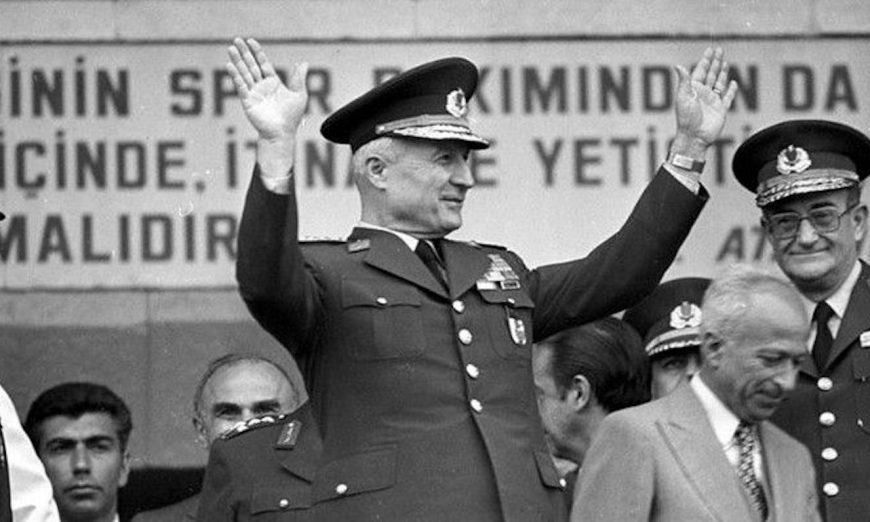Arrests, tortures, executions
On and after Sept. 12, 1980, 650,000 people from every part of the political spectrum were taken into custody. Stadiums were turned into detention centers. Those arrested were held in police and military centers for up to 150 days without any contact with their relatives or a lawyer. Almost everyone was severely tortured. According to official numbers 171 people died from torture. A total of 49 people were executed. A total of 210,000 trials were begun in military courts. In these trials, 85,000 people were tried, and, needless to say, they were all denied the most basic rights of the accused.
A total of 1,683,000 people were put in police files as “communists, Alevis, Kurds and Kurdish nationalists, religious, Shariah supporters.” In the trials that took place, there were 6,353 demands for the death penalty.
A total of 348,000 people had their passports taken away. Military officers dismissed 14,509 public employees simply at their own discretion. A total of 23,667 associations were closed, as well as political parties and trade unions.
The 113,607 books belonging to the Science and Socialism Publishers were burned by administrators of martial law in Mamak, in the province of Ankara. Publisher İlhan Erdost was killed. In total, 39 tons of books, journals and newspapers were destroyed. Eight newspapers were closed for 195 days. A total of 937 films were banned.
Total immunity for coup plotters
The coup plotters prepared a new constitution, and they put a specific article in this (1982) constitution so that they could benefit from total immunity. In 30 years, none of the generals who planned and orchestrated this coup have been held accountable.
There were a few brave but unsuccessful attempts to bring these generals to justice; they all failed because of “temporary” Article 15 of our Constitution, which does not allow the trial of the members of the National Security Council formed by the coup plotting generals after the military intervention in 1980.
Adana Chief Prosecutor Sacit Kayasu was dismissed from his job and barred from taking on any public position by the Supreme Board of Judges and Prosecutors (HSYK) in 2000 just because he had attempted to prosecute the 1980 coup plotters.
On Sept. 12, 2010, on the 30th anniversary of the 1980 coup, we will have a referendum on a package amending some articles of the 1980 Constitution. If this package is approved, among other changes, this provisional article of the Constitution on the immunity of coup plotters will be history. It will be taken out of the Constitution.
Therefore, there is now an intense debate over whether Turkey could actually try the 1980 coup plotters after the referendum.
This debate is focused on the question of whether the coup plotters could be put on trial in spite of the statute of limitations under Turkish law. According to Article 67 of the Turkish Penal Code (TCK), the time limit within which to file charges or accuse someone of a crime is 30 years. On the day of the referendum the time limit will expire, and most probably our Supreme Election Board (YSK), which consists of pro-status quo bureaucrats, has chosen this date on purpose to protect the 1980 coup plotters from prosecution.
I do not want to go into detail about the legal discussions which only focus on the wrong thing and unnecessary legal paradigms. By only focusing on the coup itself, they miss the crucial point, which is bringing the coup plotters to justice.
Yes, we can
Because of the statute of limitations, it may not be possible to put those generals on trial for the coup itself. But if we look at it from another perspective, we can see that there are some other legal provisions that can be used to bring successful cases against these generals.
The TCK was amended in 2004 and a new crime, the crime against humanity, was included. According to Article 77 of the TCK: “The execution of any one of the following acts systematically undertaken against a sector of a community for political, philosophical, racial or religious reasons constitutes the legal basis of an offenses against humanity. … (c) torturing, infliction of severe suffering, or forcing a person to live as a slave, (d) to restrict freedom … These offenses are not subject to the statute of limitations.”
Systematic torture and arbitrary restrictions of the freedoms of hundreds of thousands of people in the 1980 coup constitute a crime against humanity, and for this crime the statute of limitations is not applicable.
One may argue, in this case, over whether this article could be applied retroactively for crimes committed in 1980 since the legal provision was introduced in 2004. Yes, for crimes against humanity laws can be applied retroactively, and this is acceptable under international human rights law.
In Kononov v. Latvia, the European Court of Human Rights (ECtHR) dealt with precisely the same question and concluded that as far as war crimes and crimes against humanity are concerned the retroactive application of criminal law does not violate the European Convention on Human Rights (ECHR).
In another case, Kolk and Kislyiy v. Estonia, the ECtHR also concluded that statutory limitations are not applicable for crimes against humanity.
There are even specific conventions on this matter. The 1968 UN Convention on the Non-Applicability of Statutory Limitations to War Crimes and Crimes Against Humanity and the 1974 European Convention on the Non-Applicability of Statutory Limitations to Crimes against Humanity and War Crimes both attest to this fact.
From a legal point of view, it is obvious that if this constitutional amendment package is passed, we can try coup plotters. For a Turkey in which books are not burnt, either out of fear or by officials, and systematic torture becomes history, we must give a wholehearted “yes” to the constitutional package, and as soon as it is passed we should press for the prosecution of the coup generals for the crimes against humanity they committed.
http://www.todayszaman.com/tz-web/102-orhan-kemal-cengiz.html

